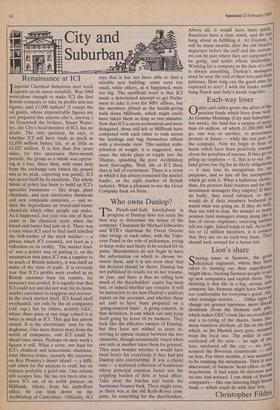City City and
Renaissance at ICI
Tmperial Chemical Industries next week lreports on its annul mirabilis. Was 1984 miraculous enough to make ICI the first British company to take its profits into ten figures, past £1,000 million? (I except the oil giants, whose impenetrable figures are not prepared like anyone else's, anyway.) At Greenwell the brokers, Stuart Warns- ley, the City's head monitor of ICI, has no doubt. The only question, he says, is whether ICI will have made as much as £1,050 million before tax, or as little as £1,025 million. It is less than five years since, for two successive three-month periods, the group as a whole was operat- ing at a loss. Since then, with some help from the exchange rate (when the pound was at its peak, exporting was penal), ICI has saved itself by its exertions. The whole thrust of policy has been to build up ICI's specialist businesses — like drugs, plant chemicals, and now electronics chemicals and new composite materials — and re- duce the dependence on bread-and-butter chemicals which other people can make. As it happened, last year was one of those years in the chemical cycle when the bread-and-butter had jam on it. There was a time when ICI used to find itself labelled the bell-wether of the stock market — a phrase which ICI resented, not least as a reflection on its virility. 'The market lead- er' was a politer way of putting it, on the assumption that since ICI was a supplier to so much of British industry, it was itself an index of the state of trade. It is certainly true that ICI's profits were eroded as its British customer base (in textiles, for instance) was eroded. It is equally true that ICI could not and did not wait for its home market customers to reappear and recover. In the stock market itself, ICI found itself overhauled, not only by the oil companies (vid. sup.) but by others, notably GEC, whose share price at one stage valued it at twice as much as ICI. That gap has almost closed. It is the electricians' turn for the doghouse. One more horror story from the world of computers, and ICI could be ahead once more. Perhaps on next week's figures it will. What a score, not least for ICI's ebullient and iconoclastic chairman, John Harvey-Jones, recently the castaway on Roy Plomley's desert island — a diffi- cult omen for the analysts to read, but on balance probably a good one. One reform still escapes him. He has not been able to move ICI out of its noble palazzo on Millbank, where, from his sixth-floor office, he can look down on the Archbishop of Canterbury. Officially, ICI says that it has not been able to find a suitable new building: some were too small, while others, as it happened, were too big. The unofficial word is that ICI made a determined attempt to get Parlia- ment to take it over for MPs' offices, but the members jibbed at the health-giving walk down Millbank, which might easily have taken them as long as two minutes. Now that ICI is more economical and more delegated, those still left at Millbank have competed with each other to rush across the landings and bag themselves offices with a riverside view. This sudden redis- tribution of weight, it is suggested, may cause the whole place to topple into the Thames, splashing, the poor Archbishop most thoroughly. Well, life at ICI these days is full of excitement. There is a sense in which it has always remained the market leader, or the right marker of British industry. What a pleasure to see the Great Company back on form.










































 Previous page
Previous page